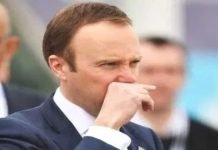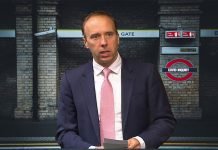The European Union has confirmed that the head of its top science organisation has resigned in frustration at the height of the coronavirus crisis.
Mauro Ferrari, an Italian-American scientist who has led the European Research Council since January, said he had resigned following a dispute over the EU’s approach to the crisis — stating he has “lost faith in the system.”
In a statement given to the Financial Times, Professor Ferrari — described as a pioneer in nanomedicine — said he had “been extremely disappointed by the European response” to the pandemic. He complained about running into institutional and political obstacles as he sought to swiftly set up a scientific programme to combat the virus.
“I have seen enough of both the governance of science, and the political operations at the European Union,” he wrote. “I have lost faith in the system itself.”
Mauro Ferrari wrote:
“RETURN TO THE FRONTLINES, TO THE FRONTIER – Mauro Ferrari
Please forgive me, but I believe that the priority now is to stop the pandemic. The priority is to save possibly millions of lives. It takes precedence over careers, politics, even the beauty of certain science. Please forgive me, but I believe in science at the service of society, especially when it counts the most. And now it does count the most, since it is only through science that Covid-19, and its successor pandemics, will ever be defeated.”
“I have been extremely disappointed by the European response to Covid-19,” said Ferrari.
As well as a failure to fund scientists to tackle the crisis, Ferrari cited a “complete absence of coordination of health care policies among member states, the recurrent opposition to cohesive financial support initiatives, the pervasive one-sided border closures, and the marginal scale of synergistic scientific initiatives” by the EU.
Ferrari also said he had been in personal contact with Commission President Ursula von der Leyen to present his ideas, at her invitation. But that, he said, “created an internal political thunderstorm.”
“In time of emergencies people, and institutions, revert to their deepest nature and reveal their true character,” he wrote, later adding: “I am afraid that I have seen enough of both the governance of science, and the political operations at the European Union.”
European Governments forced Commission into U-turn over fears it was moving too quickly in lifting the lockdown

On Tuesday the EU was forced to do a U-turn and drop its controversial lockdown exit plan after anger from member states.
The European Commission was forced by angry EU governments on Tuesday to drop plans to present a “roadmap” for ending the coronavirus lockdowns.
Governments made clear that the plans from President Ursula von der Leyen’s Commission would send a dangerous signal when they are still urging millions of citizens to stay at home to save lives.
The Commission’s embarrassing U-turn highlighted tensions over lockdowns between the EU executive and member governments. Brussels has been keen to play a coordinating role in managing the response to the coronavirus crisis after countries initially imposed a chaotic array of unilateral measures.
The Commission’s chief spokesman, Eric Mamer, announced at his regular midday press briefing that commissioners would on Wednesday “focus on the roadmap to exit, which will be adopted tomorrow.” Von der Leyen herself would brief reporters on the plan, Mamer said.
But by early evening, the Commission had backtracked, saying in an email that commissioners would only hold “an orientation debate on a roadmap to exit the restrictive measures” and that von der Leyen’s news conference was postponed until the plan had been adopted.
Adoption of the plan has now been postponed until “after Easter,”
Officials said a group of EU member governments had told the Commission in no uncertain terms that it was on the wrong track, at a time when many countries are still struggling with the impact of the virus on their public health systems and populations.
“We criticized them for not being able to consult [on] this with member states in an appropriate way,” said one senior diplomat.
Another diplomat summed up the confusion by sending a text message with a GIF of a spinning head, noting that this was not the first Commission U-turn on the issue of exit strategy.
The Commission had pitched its plan as a coordination effort to stop countries easing lockdown measures too quickly, as announcements by some capitals caused irritation in Brussels.
“If anything these restrictive measures have only [just] begun to show proper results,” said a Commission official, who spoke on condition of anonymity.
“It is of essence now that member states persist a few weeks more and then gradually start to relax them,” the official said, adding that “exit steps need to be smart and coordinated as much as possible throughout Europe.”
U.K. ship without a captain

The U.K. also seem to be acting like a ship without a captain while Boris Johnson is incapacitated in intensive care.
Boris Johnson took the unprecedented step of curtailing individual freedoms to prevent the further spread of coronavirus.
The Prime Minister said that measures would be in place for three weeks – until April 13 – and then reviewed.
Four days ago, Boris Johnson was heralding a ramp-up of testing as “the way through the coronavirus puzzle”. His health secretary, Matt Hancock, was even floating the idea of immunity passports for people who could be confirmed as having recovered from the virus, so that they could return to work.
But on Monday the government’s message was very different, following multiple reports that antibody tests were showing poor reliability. One government adviser, Prof Sir John Bell of Oxford University, said testing was at least a month away.
Dominic Raab, the foreign secretary, said it was too early yet to be talking about an exit strategy from the lockdown. Even discussing ways out could “confuse the messaging” about the importance of sticking to physical distancing rules, he added.
But given the expected trajectory of the disease, and the decisions taken by other countries who are ahead of Britain in terms of virus progression, it is unlikely the restrictions will be lifted then.
Dominic Raab, deputising for Boris Johnson, said on Tuesday that the worst thing the country could do was “take its foot off the peddle” in terms of the strict social distancing measures when asked whether the Government had decided to extend the lockdown.
“In terms of the review, we are not at that stage yet,”
#StayHomeSaveLives#covid19uk #Coronavirus #SocialDistancing #NHSPPE #StayHomeSaveLives #PPEforNHS
Support Independent Journalism Today
Our unwavering dedication is to provide you with unbiased news, diverse perspectives, and insightful opinions. We're on a mission to ensure that those in positions of power are held accountable for their actions, but we can't do it alone. Labour Heartlands is primarily funded by me, Paul Knaggs, and by the generous contributions of readers like you. Your donations keep us going and help us uphold the principles of independent journalism. Join us in our quest for truth, transparency, and accountability – donate today and be a part of our mission!
Like everyone else, we're facing challenges, and we need your help to stay online and continue providing crucial journalism. Every contribution, no matter how small, goes a long way in helping us thrive. By becoming one of our donors, you become a vital part of our mission to uncover the truth and uphold the values of democracy.
While we maintain our independence from political affiliations, we stand united against corruption, injustice, and the erosion of free speech, truth, and democracy. We believe in the power of accurate information in a democracy, and we consider facts non-negotiable.
Your support, no matter the amount, can make a significant impact. Together, we can make a difference and continue our journey toward a more informed and just society.
Thank you for supporting Labour Heartlands












